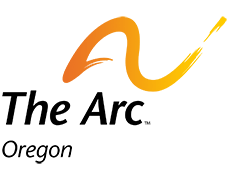
Legal Guardianship
The Arc Oregon may be appointed guardian by the court for an adult person, known as a “protected person”, who is unable to give informed consent and/or advocate on their own behalf.
As guardian, The Arc Oregon is responsible for the care and comfort of the protected person. This includes establishing the person’s place of residence, arranging for support services, and making medical decisions.
The Oregon Revised Statutes state guardianship should “promote and protect the well-being of the person…and be designed to encourage the development of maximum self-reliance and independence.” The Arc Oregon delivers its guardianship services in a manner that respects the individual, assists them in making their own decisions when possible, and seeks the least restrictive alternative available based on the person’s needs.
FAQs
Guardianship is the management of the affairs of a another person. Guardianship is established through a legal process and used when a person cannot make or communicate safe or sound decisions about their own person or property. It can also be implemented for a person who has become susceptible to abuse, fraud, exploitation, or undue influence.
In Oregon, legal guardianship can be established either for a person or a person’s estate. A guardian of an estate is also known as a Conservator.
The guardian or conservator is the person or agency appointed by a court to make decisions about various aspects of the protected person’s life, such as:
- Medical treatment
- Living situation
- Education and vocational needs
- Personal decisions
- Financial decisions
- End of Life planning
Existence of an intellectual or developmental disability is not, by itself, sufficient reason to declare someone incapacitated for the purposes of seeking guardianship. The determination of incapacity is based on a person’s inability to make or communicate a decision, and/or the risk of harm they may cause or experience because of their inability to provide for themselves or manage their own affairs.
In many cases, there are no easy answers to this question. The person’s decision-making capacity, medical needs, residential issues, and need for advocacy assistance should be considered. Individuals with similar abilities may require different levels of intervention and assistance, depending on their family involvement, living situations and available supports.
Questions to consider:
- Does the person understand that a particular decision needs to be made?
- Does the person understand the options available in any decision?
- Does the person understand the consequences of each option?
- Given support and objective assistance, can the person make a decision based on knowledge of the situation?
- Is the person able to properly inform appropriate parties once the decision has been made?
- Can the person express personal wishes and preferences?
- Is the person living in a residence where these preferences are respected?
- Does the person have a sense of what is needed for their own well-being?
- Does the person understand basic medical treatment decisions related to their medical needs?
An individual may need guardianship services if they cannot make sound decisions, with or without support, about where to live and work, how and when to seek medical care or other professional services, how to properly care for dependents, or how to purchase items such as food and clothing.
Legal guardianship should be sought only after all suitable alternatives have been explored and proven to be ineffective.
There are several less restrictive alternatives to legal guardianship. These options may offer a way for a person to avoid guardianship but receive other means of support they need to maintain their individual rights and independence. For example, someone who lives alone and has trouble managing money may benefit from a representative payee, or a restricted bank account and the occasional visit of a case manager, family member or other trusted person for help in budgeting money and paying bills.
Alternatives do not always carry the “legal weight” of guardianship. Instead, they may only legally protect the person or property to a limited degree, or provide services or supports that may meet the person’s needs without restricting their individual rights. It is a good idea to consult with a knowledgeable attorney experienced in disability issues to make sure alternate plans do not inadvertently jeopardize government benefits or create other legal problems.
Alternatives to guardianship include:
For more information on each of these and other options, download the Options in Oregon booklet developed by the Oregon Department of Human Services (DHS) and the Working Interdisciplinary Networks of Guardianship Stakeholders (WINGS) group.
Yes!
In general, a guardian may NOT limit a person’s right to:
- Get married
- Vote
- Seek or retain employment
The court also has discretion to grant a limited guardianship that limits the guardian’s authority to specific areas as outlined by the court. This may be used when a person is capable in some ways but not in others in order to ensure the guardianship is not broader than necessary to meet the person’s needs.
Some decisions may not be made by a guardian without a court order approving the decision. These decisions include:
- Consenting to sterilization or abortion. If a surgery is necessary or medical reasons that may result in sterilization, this procedure must be reviewed by Disability Rights Oregon before consent can be given. In some cases, two medical opinions may be required.
- Committing the person to a facility or institution.
- Consenting to experimental medical treatments.
- Filing for a divorce.
- Consenting to termination of parental rights.
For more information on specific limitations of guardians, see ORS 125.320.
Our GAPS Advocates become a part of a person’s life, listening to their needs, being a trusted friend, and supporting them with important decisions about where they live, medical care, supports and services, future planning, and enhancing the quality of life. This approach applies whether The Arc Oregon is appointed legal guardian or health care representative, or is acting in an advocacy role.
In addition to following the best practices guidelines of the National Guardianship Association, we work closely with the person’s support team to ensure all supports and services are designed in a way that honors the person’s values and choices.
The GAPS Advisory Committee supports the GAPS program representatives by offering advice and oversight. The committee is made up of volunteers who have interest, experience, and expertise in supporting people in with I/DD. In additional to personal experience, members may have an area of proficiency that helps the GAPS staff make informed decisions about medical, legal, behavioral and other aspects of a person’s life.
Whenever and to whatever extent possible, the individual is directly involved in the decision-making process.
The Arc Oregon strives to deliver GAPS services in a way that respects the individual, assists them in making their own decisions when possible, and seeks the least restrictive alternative available based on a person’s needs.
To find out if our services are right for the person, we start with a conversation. We would like to meet with the person and their support team to learn more about them. From there, we can help develop a plan of support for the person, determine what services are needed, discuss fees and payment arrangements, and guide you through the service application process.
The Arc Oregon is a choice of last resort, so if there is a family member or other trusted friend in the person’s life that can serve as guardian, we may choose not to step into that role.
To get more information and/or schedule an appointment, please contact our GAPS Program Director.
An appointed guardian may inform the court through his or her Last Will and Testament (also known as a testamentary nomination) who he or she wishes to be guardian following the testator’s (current guardian’s) death. In Oregon, the courts give special consideration to the person nominated, although the person ultimately selected must be both willing and capable of serving and must be found by the court to be fit to serve.
The Arc Oregon does accept testamentary nominations as successor guardian. Family members currently serving as a guardian who want to nominate The Arc Oregon must first meet with the GAPS Program Director and complete a guardianship application before listing The Arc Oregon as the successor.
If all less restrictive alternatives have been ruled out, you should consult with an attorney specializing in guardianship proceedings for advice on moving forward to seek legal guardianship.
The basic steps are:
- You, through your attorney, would file a petition with the Probate Court in the county where the proposed protected person lives.
- Notice of the filing is served on the proposed protected person
- A Court Visitor is then appointed by the court to interview the person, the proposed guardian, and any others with relevant information.
- The Court Visitor’s report is reviewed by the court; additional information may be sought by the court if needed.
- Guardianship is established and the petitioner is appointed as guardian if the court determines it appropriate.
For more information on protective proceedings, see ORS 125.005-125.030.
